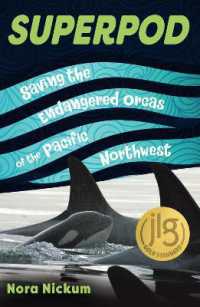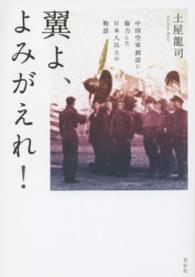- ホーム
- > 洋書
- > 英文書
- > History / World
Full Description
Seven hundred and fifty Jewish refugees fled Nazi Germany and founded the agricultural settlement of SosÚa in the Dominican Republic, then ruled by one of Latin America's most repressive dictators, General Rafael Trujillo. In Tropical Zion, Allen Wells, a distinguished historian and the son of a SosÚa settler, tells the compelling story of General Trujillo, Franklin Delano Roosevelt, and those fortunate pioneers who founded a successful employee-owned dairy cooperative on the north shore of the island. Why did a dictator admit these desperate refugees when so few nations would accept those fleeing fascism? Eager to mollify international critics after his army had massacred 15,000 unarmed Haitians, Trujillo sent representatives to Évian, France, in July, 1938 for a conference on refugees from Nazism. Proposed by FDR to deflect criticism from his administration's restrictive immigration policies, the Évian Conference proved an abject failure. The Dominican Republic was the only nation that agreed to open its doors. Obsessed with stemming the tide of Haitian migration across his nation's border, the opportunistic Trujillo sought to "whiten" the Dominican populace, welcoming Jewish refugees who were themselves subject to racist scorn in Europe.
The Roosevelt administration sanctioned the SosÚa colony. Since the United States did not accept Jewish refugees in significant numbers, it encouraged Latin America to do so. That prodding, paired with FDR's overriding preoccupation with fighting fascism, strengthened U.S. relations with Latin American dictatorships for decades to come. Meanwhile, as Jewish organizations worked to get Jews out of Europe, discussions about the fate of worldwide Jewry exposed fault lines between Zionists and Non-Zionists. Throughout his discussion of these broad dynamics, Wells weaves vivid narratives about the founding of SosÚa, the original settlers and their families, and the life of the unconventional beach-front colony.
Contents
Abbreviations ix
Prologue xi
Part One: The Refugees' Plight
1. "Our Ethnic Problem" 3
2. Think Big 28
3. Jewish Farmers 44
Part Two: Converging Interests
4. "The Eyes of the World Are on the Dominican Republic" 69
5. One Good Turn 91
6. Lives in the Balance 105
7. Playing God 127
Part Three: Growing Pains
8. First Impressions 151
9. Flawed Vision 176
10. Containment 198
11. Trial and Error 219
Part Four: Middle Age
12. The Man Who Saved Souls 243
13. A "Splendid President" 266
14. Golden Years 281
15. "The Beginning of the End" 299
16. Ravages of Aging 314
Epilogue 339
Acknowledgments 355
Notes 359
Bibliography 409
Index 437




![Diccionario de Ling]mstica Moderna](../images/goods/../parts/goods-list/no-phooto.jpg)



